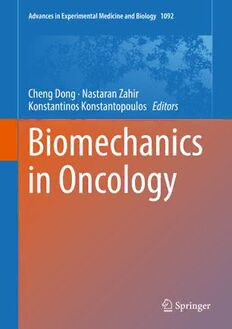
Biomechanics in Oncology PDF
Preview Biomechanics in Oncology
Advances in Experimental Medicine and Biology 1092 Cheng Dong · Nastaran Zahir Konstantinos Konstantopoulos Editors Biomechanics in Oncology Advances in Experimental Medicine and Biology Volume 1092 EditorialBoard IRUNR.COHEN,TheWeizmannInstituteofScience,Rehovot,Israel ABELLAJTHA,N.S.KlineInstituteforPsychiatricResearch,Orangeburg, NY,USA JOHND.LAMBRIS,UniversityofPennsylvania,Philadelphia,PA,USA RODOLFOPAOLETTI,UniversityofMilan,Milan,Italy NIMAREZAEI,TehranUniversityofMedicalSciencesChildren’sMedical Center,Children’sMedicalCenterHospital,Tehran,Iran Moreinformationaboutthisseriesathttp://www.springer.com/series/5584 Cheng Dong · Nastaran Zahir Konstantinos Konstantopoulos Editors Biomechanics in Oncology 123 Editors ChengDong NastaranZahir DepartmentofBiomedicalEngineering DivisionofCancerBiology PennsylvaniaStateUniversity NationalCancerInstitute, UniversityPark,PA,USA NationalInstitutesofHealth Rockville,MD,USA KonstantinosKonstantopoulos DepartmentofChemicalandBiomolecular Engineering InstituteforNanoBioTechnology JohnsHopkinsUniversity Baltimore,MD,USA ISSN0065-2598 ISSN2214-8019 (electronic) AdvancesinExperimentalMedicineandBiology ISBN978-3-319-95293-2 ISBN978-3-319-95294-9 (eBook) https://doi.org/10.1007/978-3-319-95294-9 LibraryofCongressControlNumber:2018955701 ©SpringerNatureSwitzerlandAG2018 Thisworkissubjecttocopyright.AllrightsarereservedbythePublisher,whetherthewhole orpartofthematerialisconcerned,specificallytherightsoftranslation,reprinting,reuseof illustrations,recitation,broadcasting,reproductiononmicrofilmsorinanyotherphysicalway, andtransmissionorinformationstorageandretrieval,electronicadaptation,computersoftware, orbysimilarordissimilarmethodologynowknownorhereafterdeveloped. Theuseofgeneraldescriptivenames,registerednames,trademarks,servicemarks,etc.inthis publicationdoes not imply,evenintheabsenceof aspecificstatement,thatsuchnamesare exemptfromtherelevantprotectivelawsandregulationsandthereforefreeforgeneraluse. Thepublisher,theauthorsandtheeditorsaresafetoassumethattheadviceandinformationin thisbookarebelievedtobetrueandaccurateatthedateofpublication.Neitherthepublisher northeauthorsortheeditorsgiveawarranty,expressorimplied,withrespecttothematerial containedhereinorforanyerrorsoromissionsthatmayhavebeenmade.Thepublisherremains neutralwithregardtojurisdictionalclaimsinpublishedmapsandinstitutionalaffiliations. ThisSpringerimprintispublishedbytheregisteredcompanySpringerNatureSwitzerlandAG Theregisteredcompanyaddressis:Gewerbestrasse11,6330Cham,Switzerland Preface Adecadeago,theNationalCancerInstitute(NCI)launchedanewprogram called the Physical Science-Oncology Network (PS-ON; https://physics. cancer.gov) in order to broadly support the integration of physical sciences perspectivesandtheoriesincancerresearchusingnewandperhapsnontradi- tionalapproaches. The overarching theme of the PS-ON program, which is to explore and uncover the physics and physical sciences principles underlying cancer- relevantperturbations,remainsvirtuallyunexploredandnotunderstood.The physicalprinciplesandlawsthatdefinethebehaviorofmatterareprofoundly important in developing an understanding of the initiation and evolution of cancer at all length scales (i.e., submolecular, molecular, cellular, tissues, organisms, and populations). The goal is to unravel the complicated and multifaceted cancer disease process through the application of approaches fromthephysicalsciencesthataretraditionallyusedtocomprehendcomplex problems.Thereremainedanopportunitytobringprinciplesandapproaches to bear from physics and engineering to cancer research. Embracing novel tool and technology development from the physical sciences into biology hasthereforebecomeanewchallengetomanyphysicalscientistsandanew adaptationbymanybiologists. Biomechanics represents an extremely important branch of the physical sciences.Inthemid-1960s,ProfessorY.C.Fungpioneeredhisvisionforap- plications oftraditionalengineeringmechanicsandtechniquesto medicine, physiology,and biology,which was a beginningera of biomechanics. Over the past several decades, biomechanics has already grown into a mature discipline in engineering and physical sciences. Investigatorsin the field of biomechanics have recently had a vested interest in conducting transdisci- plinary research in physical sciences-oncology. In 2012, the United States National Committee on Biomechanics (USNCB) sponsored its national Frontiers Symposium and, for the first time, focused on “Mechanics in Oncology,”chairedbyChengDongfromPennState, FanYuanfromDuke, andLanceMunnfromMGH/Harvard(http://usncb.org/frontiers).Thisseries of symposia and workshops of Bioengineering in Oncology has become a sustained event at the Biomedical Engineering Society (BMES) annual conferences. This is certainly an exciting time to be studying Biomechanics in On- cology. To maintain a vision on the horizon of where the biomechanics in oncology field will need to go, we brought several leading scientists v vi Preface to contribute to this book that is centered on discussing our emerging challenges and identifying context for the current state of biomechanics in oncology.Mostimportantly,thisbookhighlightstheaspectsofbiomechanics at different biological length scales, from inside and outside the cancer cell as well as in the circulation, all in the context of tumor initiation, progressionandmetastasis, andtreatment.Manyofthechallengesinstudy- ing biomechanics in oncology have been tempered by the development of novel technologies for imaging and precisely measuring and quantifying cellular and extracellular mechanical forces. The book also discusses those technological approaches for studying biomechanics in oncology. In every aspect of biomechanics, it critically evaluates where we are and where we need to be to understand the significance and impact of mechanics in the contextofcancer. Thisbookismostappropriateforanyonewhowantstokeepabreastofthis new,convergingfieldandtheever-changingapplicationssinceProfessorY.C. Fung started in the mid-1960s. We hope you enjoy this book highlighting the latest and greatest in biomechanics, and we look forward to your contributionstothefutureofBiomechanicsinOncology. UniversityPark,PA,USA ChengDong Rockville,MD,USA NastaranZahir Baltimore,MD,USA KonstantinosKonstantopoulos Contents 1 TheNationalCancerInstituteInvestmentinBiomechanics inOncologyResearch .................................... 1 AnthonyDickherber,ShannonK.Hughes,andNastaranZahir 2 DNAMechanicsandTopology ............................ 11 SumitabhaBrahmachariandJohnF.Marko 3 MechanicsoftheCellNucleus............................. 41 Dong-HweeKim,JungwonHah,andDenisWirtz 4 ExtracellularMatrixStiffnessExistsinaFeedbackLoopthat DrivesTumorProgression ................................ 57 AllisonK.Simi,Mei-FongPang,andCelesteM.Nelson 5 Microenvironment Influences Cancer Cell Mechanics fromTumorGrowthtoMetastasis......................... 69 DeeprajGhoshandMichelleR.Dawson 6 MechanicalForcesinTumorAngiogenesis.................. 91 MatthewR.ZanotelliandCynthiaA.Reinhart-King 7 FromCancerImmunoediting toNewStrategiesinCancer Immunotherapy:TheRolesofImmuneCellsandMechanics inOncology ............................................. 113 VirginiaAragon-Sanabria,GloriaB.Kim,andChengDong 8 Exposing Cell-Itary Confinement: Understanding theMechanismsofConfinedSingleCellMigration .......... 139 BinShengWong,PanagiotisMistriotis, andKonstantinosKonstantopoulos 9 ModelingCellMigrationMechanics ....................... 159 LouisS.PrahlandDavidJ.Odde 10 EngineeredModelsofMetastasiswithApplicationtoStudy CancerBiomechanics .................................... 189 MichelleB.Chen,RogerD.Kamm,andEmadMoeendarbary 11 BiomechanicsoftheCirculatingTumor CellMicroenvironment................................... 209 BenjaminL.KrogandMichaelD.Henry vii viii Contents 12 Platelet-BasedDrugDeliveryforCancerApplications....... 235 NerymarOrtiz-Otero,ZeinabMohamed,andMichaelR.King 13 BiomaterialsinMechano-oncology:MeanstoTuneMaterials toStudyCancer......................................... 253 Shelly R. Peyton, Maria F. Gencoglu, Sualyneth Galarza, andAlyssaD.Schwartz 14 DesignofFiberNetworksforStudyingMetastatic Invasion................................................ 289 ApratimMukherjee,AniketJana,BrianKoons, andAmrinderNain 15 TractionForceMicroscopyforNoninvasiveImagingofCell Forces ................................................. 319 JeffreyA.Mulligan,FrançoisBordeleau, CynthiaA.Reinhart-King,andStevenG.Adie 16 NoninvasiveImaging:BrillouinConfocalMicroscopy ....... 351 MilošNikolic´,ChristinaConrad,JitaoZhang, andGiulianoScarcelli Index ...................................................... 365 Contributors Steven G.Adie Meinig School of Biomedical Engineering, Cornell Uni- versity,Ithaca,NY,USA VirginiaAragon-Sanabria DepartmentofBiomedicalEngineering,Penn- sylvaniaStateUniversity,UniversityPark,StateCollege,PA,USA FrançoisBordeleau Centre de Recherche du CHU de Québec, Université Laval,Québec,Qc,Canada Département de Biologie Moléculaire, Biochimie, Médicale et Pathologie, Université,Laval,Québec,Qc,Canada SumitabhaBrahmachari NorthwesternUniversity,Evanston,IL,USA Michelle B.Chen Department of Mechanical Engineering, Massachusetts InstituteofTechnology,Cambridge,MA,USA ChristinaConrad Fischell Department of Bioengineering, University of Maryland,CollegePark,MD,USA Michelle R.Dawson DepartmentofMolecularPharmacology,Physiology, andBiotechnology,BrownUniversity,Providence,RI,USA CenterforBiomedicalEngineering,BrownUniversity,Providence,RI,USA SchoolofEngineering,BrownUniversity,Providence,RI,USA AnthonyDickherber Center for Strategic Scientific Initiatives, National CancerInstitute,NationalInstitutesofHealth,Bethesda,MD,USA ChengDong Department of Biomedical Engineering, Pennsylvania State University,UniversityPark,StateCollege,PA,USA SualynethGalarza Department of Chemical Engineering, University of MassachusettsAmherst,Amherst,MA,USA Maria F.Gencoglu Department of Chemical Engineering, University of MassachusettsAmherst,Amherst,MA,USA DeeprajGhosh Department of Molecular Pharmacology, Physiology, and Biotechnology,BrownUniversity,Providence,RI,USA JungwonHah KoreaUniversity,Seoul,S.Korea ix x Contributors Michael D.Henry Department of Molecular Physiology and Biophysics, CarverCollegeofMedicine,UniversityofIowa,IowaCity,IA,USA DepartmentofPathologyandUrology,CarverCollegeofMedicine,Univer- sityofIowa,IowaCity,IA,USA HoldenComprehensiveCancerCenter,CarverCollegeofMedicine,Univer- sityofIowa,IowaCity,IA,USA Shannon K.Hughes Division of Cancer Biology, National Cancer Insti- tute,NationalInstitutesofHealth,Rockville,MD,USA AniketJana STEP Lab, Department of Mechanical Engineering, Virginia Tech,Blacksburg,VA,USA Roger D.Kamm Department of Mechanical Engineering, Massachusetts InstituteofTechnology,Cambridge,MA,USA Department of Biological Engineering, Massachusetts Institute of Technol- ogy,Cambridge,MA,USA Dong-HweeKim KoreaUniversity,Seoul,S.Korea Gloria B.Kim DepartmentofBiomedicalEngineering,PennsylvaniaState University,UniversityPark,StateCollege,PA,USA Michael R.King DepartmentofBiomedicalEngineering,VanderbiltUni- versity,Nashville,TN,USA KonstantinosKonstantopoulos Department of Chemical and Biomolecu- larEngineering,InstituteforNanoBioTechnology,JohnsHopkinsUniversity, Baltimore,MD,USA BrianKoons STEP Lab, Department of Mechanical Engineering,Virginia Tech,Blacksburg,VA,USA Benjamin L.Krog Department of Molecular Physiology and Biophysics, CarverCollegeofMedicine,UniversityofIowa,IowaCity,IA,USA John F.Marko NorthwesternUniversity,Evanston,IL,USA PanagiotisMistriotis DepartmentofChemicalandBiomolecularEngineer- ing,InstituteforNanoBioTechnology,JohnsHopkinsUniversity,Baltimore, MD,USA EmadMoeendarbary Department of Biological Engineering, Massa- chusettsInstituteofTechnology,Cambridge,MA,USA Department of Mechanical Engineering, University College London, London,UK ZeinabMohamed DepartmentofBiomedicalEngineering,CornellUniver- sity,Ithaca,NY,USA ApratimMukherjee STEP Lab, Department of Mechanical Engineering, VirginiaTech,Blacksburg,VA,USA
